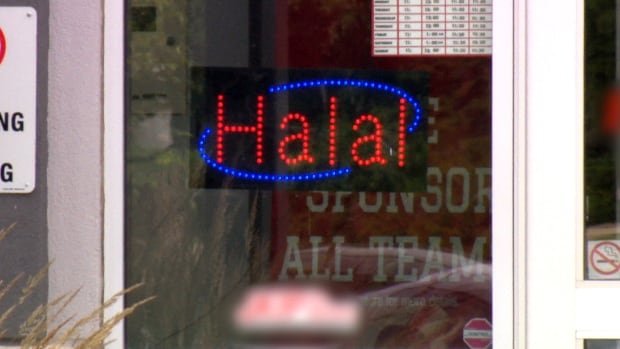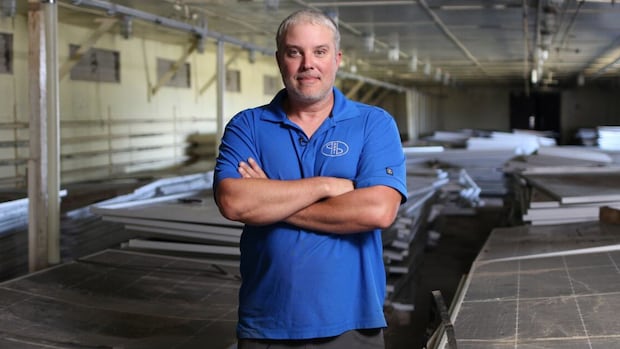Halal claims exposed; Retailers spending millions on police to combat theft: CBC’s Marketplace cheat sheet
Miss something this week? Don’t panic. CBC’s Marketplace rounds up the consumer and health news you need.
Want this in your inbox? Get the Marketplace newsletter every Friday.
Fast-food chains serving up halal food with a side of misinformation, expired certificates
Challenging and frustrating.
That’s how Mohammad Arfan describes his experience trying to get the answers he needs before sitting down to a meal.
As the face of In2Spices, a YouTube channel he runs with his wife, Sarah, dedicated to profiling halal restaurants, he eats out a lot — and his 13,000 followers are proof Canadians are hungry for halal options they can trust.
“You want to walk in with your friends and your family to have a nice meal … the last thing you want to be worried about is the pizza in front of me,” Arfan said.
Walking out of restaurants because he’s not sure the halal food he’s about to enjoy meets his standards is a sad but all too common reality for the couple, and one that may be familiar to the almost two million Muslims across Canada.
“It happened just last week,” said Arfan.
Canadians are spending more than a billion dollars a year on halal food products. And an increasing number of fast-food giants are trying to cash in on that market by offering halal menu items.
But a Marketplace investigation found that some of those chains can’t answer basic questions about the halal items they’re selling, and the certification they provide as proof can’t always be trusted.
The Canadian Food Inspection Agency requires any product that’s labelled, advertised or sold as halal to be certified. But consumers, including Arfan, say getting clear information about the halal items on the menu, and the restaurant’s suppliers, isn’t easy.
What’s worse, says Sarah Arfan, is when restaurants get it wrong. Misinformation about halal food they’re consuming is harmful, she said.
“At the end of the day, it affects our faith and our belief.” Read more.
-
Watch Marketplace’s full hidden-camera investigation, where we head inside some of Canada’s most popular chain restaurants, this Friday at 8 p.m., 8:30 p.m. in Newfoundland, on CBC-TV and anytime on YouTube or CBC Gem.
Major retailers spend millions hiring Winnipeg police officers on overtime to stop shoplifters

One of Canada’s largest retailers is spending more than $200,000 a month hiring Winnipeg police officers to protect its business, an increase police and experts say points to the growing crisis of retail theft in the city.
Data obtained by CBC through freedom-of-information laws show that over the past five years, Real Canadian Superstore, owned by Loblaw, has spent over $12 million on special duty police officers.
These are officers working overtime to do tasks outside their regular job, with their wages paid by clients. The Winnipeg Police Service charges $128 an hour plus tax for the services of a police constable.
Small business owner Sarah Esperanza estimates she loses hundreds of dollars each week to theft from her West End shop, which specializes in Latin American food and goods, but she can’t afford to hire police officers.
“What can we do?” said Esperanza, who has owned El Izalco Market for 24 years after moving from El Salvador to Canada.
“There is no end, but nobody [is] taking consideration. We as small businesses are the ones that are keeping up the economy, and who is helping us?”
A Loblaw spokesperson said the use of these officers at select Winnipeg stores has been effective.
Across the country, the retailer has seen a significant increase in theft and violent encounters at its stores, the spokesperson said, calling it a “massive, industry-wide issue.”
The use of officers “is simply one of many measures we take to keep our customers, employees, and stores safe,” the spokesperson said in an email statement. Read more.
These busted solar panels are an early example of a looming problem — and an opportunity
According to the Smart Prosperity Institute, by 2050 the country will be dealing with hundreds of thousands of tonnes of unusable solar panels and wind turbine blades. Some businesses are looking at this looming source of waste with dollar signs in their eyes.
In a sprawling industrial building in Brooks, Alta., about two hours east of Calgary, is a former pheasant hatchery that’s now stacked waist-high with thousands of dusty, damaged solar panels.
Dan Carrocci, who’s worked in renewable energy construction for more than a decade, has long been troubled by the lack of end-of-life options for this infrastructure and is stockpiling the old panels in hopes of developing a commercially viable means of recycling them.
He’s now built up a stash of nearly 10,000 panels that have been damaged during manufacturing, pummelled by hail or banged up during installation.
“I call it the ‘big green elephant’ of renewable energy — [it’s] the waste material,” said Carrocci, president of Sunset Renewable Asset Management.
Installation of solar and wind power is on the rise, but according to a 2021 report from the University of Ottawa think-tank the Smart Prosperity Institute, decommissioned solar panels and wind turbine blades often end up sitting in storage or being sent to landfill.
Much of the wind and solar infrastructure in this country is fairly new, but by 2050 the Smart Prosperity Institute said conservative estimates suggest Canada could see a cumulative 365,000 to 470,000 tonnes of expired solar panel waste and 4.5 million tonnes of wind turbine waste, though the institute said the total will be much higher if the country plans to hit its net-zero targets.
“Just producing that much waste, landfilling it going forward, it’s not really a sustainable solution,” said Geoff McCarney, the institute’s senior research director.
While it’s critical to keep ramping up use of renewables, he said, there’s concern “we’re creating other environmental problems while trying to address the climate problem.” Read more.
What else is going on?
Lufthansa fined record $4M for barring Orthodox Jewish passengers from 2022 flight
German airline denied discrimination but acknowledged errors in company procedure
Bubble tea company apologizes after Dragons’ Den cultural appropriation spat
Expert says a rebrand might be in order for the Quebec City company.
This slime is threatening drinking water, but these scientists have a solution
CBC’s Jaela Bernstien heads out on Lake Erie with scientists.
Marketplace needs your help!

Any gripes or groans you think we should know about? Send us a message: marketplace@cbc.ca.
Mind Your Business is your weekly look at what’s happening in the worlds of economics, business and finance. Subscribe now.
Catch up on past episodes of Marketplace on CBC Gem.



